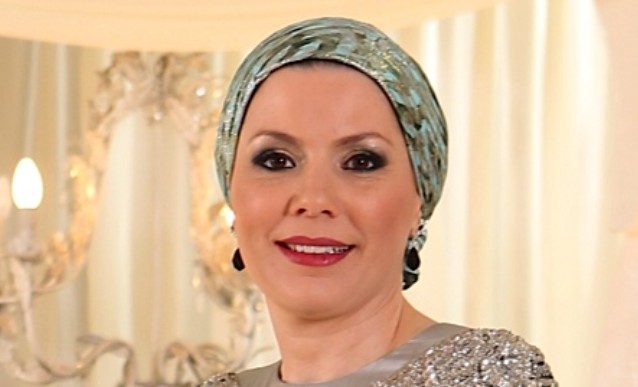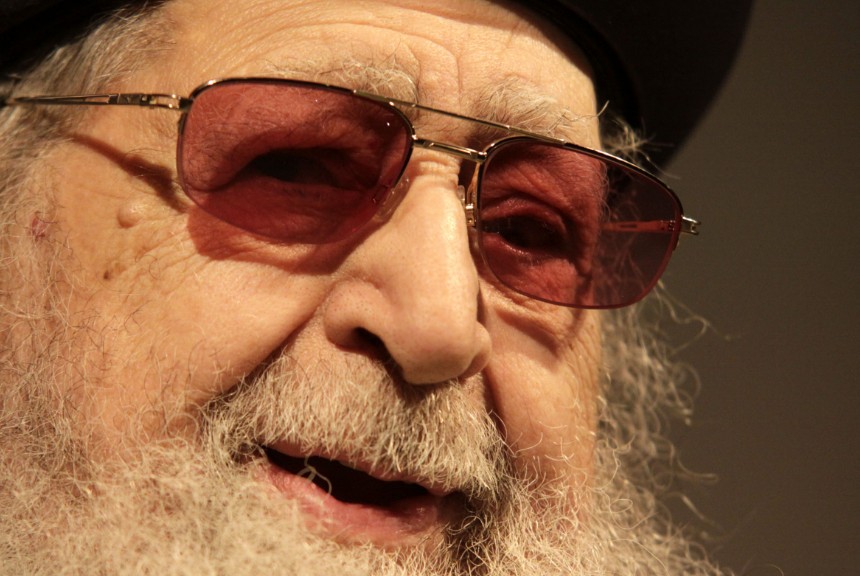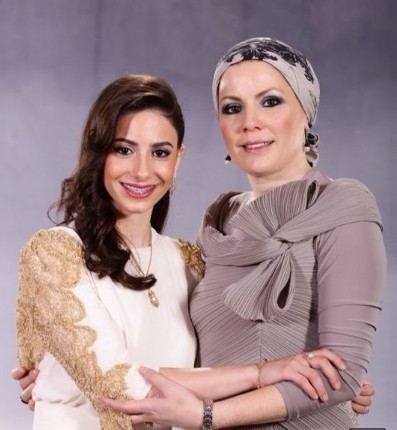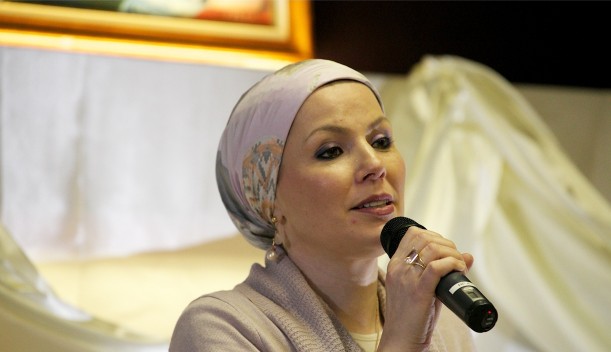Rebbetzin Yehudit Yosef: Struggling to Find Comfort
As the anniversary of Maran's passing is marked these days, for his daughter-in-law, Rebbetzin Yehudit Yosef, it's the day when the heart of Israel fell silent. In a special interview, Rebbetzin Yosef recounts the moments of farewell and life thereafter.

Eleven months have passed since the passing of Rabbi Ovadia Yosef zt"l, yet his daughter-in-law Rebbetzin Yehudit Yosef (43) seems unable to find solace. Whenever she sees the empty bedroom or the idle books waiting for only him to open them, her heart aches and the tears continue to flow. Although nearly a year has gone by, his absence has grown only more profound for her. When speaking of the rabbi, the sorrow is evident in her voice. "As each day passes, his absence is felt even more," she describes, "The last year has been very difficult. People approach me and say, 'It feels like the rabbi is in his home in Jerusalem writing books and everything is as usual,' but it's not like that. The rabbi is not here, and this reality hits me every time. I once thought the tears would dry, but apparently not. I miss his personality."
 Rebbetzin Yehudit Yosef. Struggling to find comfort
Rebbetzin Yehudit Yosef. Struggling to find comfortTo understand the special bond formed between Maran zt"l and his daughter-in-law, we must go back 26 years to when Rebbetzin Yosef married Moshe, the rabbi's youngest son who was deeply connected to his parents. "I was only 16 and a half when my future mother-in-law, Rebbetzin Margalit a"h, suggested the match to my mother. My mother wasn't keen on marrying me off at a young age, but out of politeness—and because the Yosef family was respectable—she agreed that I could marry at 17. And so it was. We met at 17 and two days, and soon became engaged. Already then, my husband explained that he was the youngest son and closely connected to his aging parents. He highlighted that he would need to assist them. I understood why they loved him—he was very easygoing, helpful, and respectful. It wasn't beyond my capacity since I came from the Abuhatzeira family, accustomed to serving Torah scholars. At my grandfather's house, I saw how the women helped the grandmother prepare meals. It wasn't new to me. Once the Sheva Brachot ended and the celebrations were over, I began visiting them every Shabbat and on holidays. While I had an apartment in Har Nof, I spent most of my time at my mother-in-law's. Today I realize I needed to be by her side to learn to care for the rabbi in the next 20 years."
 Maran zt
Maran ztDuring the six years spent with Rebbetzin Margalit a"h, Rebbetzin Yosef learned that Maran did not like to inconvenience those around him. "I noticed that the rabbi didn’t like to inconvenience others; so I learned when to bring him tea or a particular book just by his facial expressions, without him asking. Once a week, on Fridays, we went to the market together, and afterward, I helped her prepare for Shabbat. This continued for six years. When my mother-in-law had a stroke during Shavuot, she seemed to sense something was happening. She called me to thank me for the comfort we provided them. It did not seem like a significant moment to me, as she wasn't ill.
"After she passed away, we remained there, as we were already living in the house. It felt natural. Although the family wanted to ease the burden and suggested that perhaps it was hard for us, the rabbi listened and said he would provide an answer that evening. He called me and asked if it was difficult for me. I answered that serving him was a privilege and told him that my grandmother, Rebbetzin Abuhatzeira, would call me to check if I was managing and doing everything correctly. After that conversation, he announced that he wanted only us to stay, and since then, 20 years have passed."
What was it like living alongside such a great man?
"Every morning, in my prayer, I would beseech Hashem: 'This is a great responsibility, so I plead that no mistakes be allowed by our hands. Guide us with good counsel.' It was a very big responsibility, and I always feared that, Heaven forbid, we would be held accountable in the afterlife for not taking enough care of the rabbi. Because of that fear, we were around him every moment. I would prepare his meals two days in advance, thinking about what he would enjoy. We were concerned about doing everything correctly. Based on the rabbi's farewell to me, including his appreciation and thanks, I hope with Hashem’s help, we did everything properly. Today I can be at ease."
 Maran saw his grandchildren as his children
Maran saw his grandchildren as his childrenNaturally, Maran's household members knew the more personal side of the generation's leader. "We knew him as a father, grandfather, and father-in-law," shares the rebbetzin, "It’s something else entirely. It's not just the tremendous leader with the rabbi's turban and robe, but a man with a soft personality. His heart was gentle. He was a man of compassion and kindness. He cared for the children deeply and didn't refer to them as grandchildren but 'children'. We were all his children. He was a caring individual who emphasized the education of children in the smallest matters. For example, when there was an exam, he was interested in what grade the child would receive, and heaven help us if it was less than a hundred.
"He was a confidant, and the great difficulty is feeling his absence now. I had someone to turn to at all hours. If I had a question for the rabbi, or if someone woke up not feeling well, we would immediately go in to receive a blessing."
Since his passing eleven months ago, Rebbetzin Yosef has been living with his absence. Although she leads an active and full schedule involving supervising and establishing kindergartens and lecturing across the country and the world about Maran, she feels his absence at every moment. "I miss the busy mornings when he would come up from the office and suddenly someone would knock on the door, followed by another," she recalls. "On Purim, at eight in the morning, there was a commotion under the house, and yet this year Purim arrived, and no one came. The neighbors came down to me, crying bitterly, 'How quiet everything is, how much he is missed.' It has been a very difficult year, and as each day passes, the loss becomes tougher. It's impossible to return to the same life. The tears keep flowing. I see his bedroom, his study room, the empty table, the sad books waiting for the rabbi to open them. Although there's activity in the study room; my sons-in-law, who are Torah scholars, learn there, and together with Rabbi Shealtiel Amar, Maran's librarian, they are working on publishing Maran's writings. Nonetheless, it is not the table filled with books that sometimes you couldn’t even see over them."
The longing seems to intensify during times and events where his absence is most felt. "During Bein HaZmanim, we always went on vacations, and upon returning to the rabbi’s house, he would say, 'It's good you are back. How much I missed you, how difficult it is when the children are not with us. Please try to be with me.' This time when we returned, I went to his bedroom and burst into tears. Every event emphasizes the fact that the rabbi is no longer. He is not alive."
Just two weeks ago, the rebbetzin’s daughter gave birth to a son. Rebbetzin Yosef insisted the brit take place in the synagogue where Maran used to pray. "Not a single eye remained dry during this occasion," she shares, "The rabbi's son, the Rishon LeZion, was the sandek. Suddenly everyone saw the son with the robe sitting on the chair. Words failed. Even after the brit, it was hard. When the rabbi was alive, he would pass by the baby's crib to check on the newborn and inquire about the mother's wellbeing. He would want to know if she ate, rested, and if the baby was nursing. That's how he cared for me too when I gave birth. Now, every event like this reminds me of the loss."
Another instance where his absence was distinct was during Operation Protective Edge. "In this war, I told my husband, 'For the first time, there's a war, and we're sleeping well at night.' In previous wars, we would hear the rabbi staying up late, then entering his room, and then the cries would begin. He prayed for the soldiers' return. He had a list of names and would go through every one. He had unparalleled concern. He cared for the entirety of the Jewish people, and his personal interest was never at the forefront. The Jewish people were his main concern."
Did you get a chance to say goodbye to Maran before his passing?
"During Chol Hamoed Sukkot, after three and a half months in which Maran did not make Kiddush, he performed Kiddush. There were Shabbat songs and words of ethics—it was a wonderful Shabbat. In hindsight, we understood that his kidneys had failed, and that's why the pain was gone. In the afternoon, he called me because he hadn't requested anything from me, I said: 'Finally, the rabbi is asking, what does the rabbi need?' He replied: 'I don't need anything, I just want to thank you for all the years. For everything you've done and dedicated to me. Know that day to day it didn't go unnoticed. I was observing and saw what it entailed.' I understood it was goodbye and started to cry. I told him that it should continue this way, but he dismissed my words with a wave of his hand. The second time I said goodbye to him was at the hospital, two days before his passing, on Motzaei Shabbat we came to the hospital and he was hoarse due to the intubation. He was in pain and suffering, but he was lucid. He said: 'Have mercy on me, do something.' I burst into tears. He looked at me and said: 'Thank you very much for everything, and again, thank you.'"
 The rebbetzin traveled to lecture about Maran around the world. (Photo: Jen Perry Levy)
The rebbetzin traveled to lecture about Maran around the world. (Photo: Jen Perry Levy)
Over the past year, Rebbetzin Yosef traveled around the world to lecture about Maran. Some of the trips were through Hidabroot—an organization the rabbi supported and encouraged. "Throughout the year I traveled for lectures on the rabbi through Hidabroot and through people," the rebbetzin shares, "In Belgium, I was surprised to meet a predominantly Ashkenazi audience that was so moved and cried. One woman shared that on the day of passing, they closed the business, went to synagogues, watched the funeral live, and when the procession began, they accompanied the coffin a few steps. It's hard for me to return to Israel and not be able to tell the rabbi how much the Jewish people love and appreciate him. He always enjoyed hearing that. This past year, when he wasn't with us, I understood why emphasizing gratitude was so important to him."
Today, almost a year after Maran's passing, Rebbetzin Yosef is involved in action and fulfilling the rabbi's will. "Two years before he passed, his will was that I enter the supervision of the kindergarten network and be responsible for establishing new kindergartens. This is what I am doing today. Maran would tell me: 'The toddlers in the House of Study are our future generation.' Since he passed, I have dedicated more to this subject, aiming for the opening of more kindergartens. It's challenging work that also involves fundraising, and the goal is to expand. With Hashem's help, this year I feel like the rabbi is helping me every moment; I feel much siata d'shamaya."
In a few weeks, the anniversary of Maran's passing will be marked. For Rebbetzin Yosef, it's the day when the heart of Israel fell silent. "I always say it's the day the heart of the great leader and the heart of Israel fell silent. The crown of the Torah has left us, and no one can replace his greatness. There is no successor for Rabbi Ovadia. I want to believe we will continue to see him with us, as we have seen all this year, and Hashem will help. We will pray for the coming of the Moshiach, for redemption, and to see the rabbi with us again."

